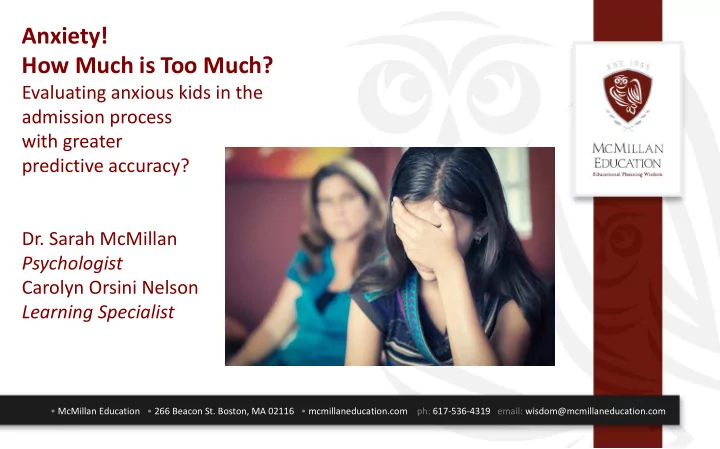

Anxiety! How Much is Too Much? Evaluating anxious kids in the admission process with greater predictive accuracy? Dr. Sarah McMillan Psychologist Carolyn Orsini Nelson Learning Specialist • McMillan Education • 266 Beacon St. Boston, MA 02116 • mcmillaneducation.com ph: 617-536-4319 email: wisdom@mcmillaneducation.com
Session goals Are you happy with your admission process • for vetting complex kids? How do you differentiate between anxiety that • will respond to change in environment vs. need for more therapeutic intervention? How do you set the kid up for success that • you’ve determined is a good risk & admitted?
What a New Environment Can Do … and Not Do • Sawyer – elite feeder school, traditional boarding applicant • Aiden – public school on an IEP looking for answers • Mike – isolated socially, academically challenged, skipping from day school to day school in LA • McMillan Education • 266 Beacon St. Boston, MA 02116 • mcmillaneducation.com ph: 617-536-4319 email: wisdom@mcmillaneducation.com
McGruff the admission detective! • What pops out that requires further investigation? • Who does this investigation and how does the admission team process this information as part of the final admission decision? • What level & type of risk are you equipped / willing to incur? • McMillan Education • 266 Beacon St. Boston, MA 02116 • mcmillaneducation.com ph: 617-536-4319 email: wisdom@mcmillaneducation.com
Categories for further investigation Neuro-cognitive profile • – Academic-related deficits & vulnerabilities – Broader developmental challenges Emotional & behavioral history • – Academic habits – Personal habits, coping skills – Family setting – Social / peers – Counseling – Psychopharmacology
What can foretell problems? Neurocognitive features that impact emotional health & functioning • Executive functions • Processing speed • Working memory • Splits between reasoning ability and performance indices • Impulsivity • Spectrum-related features • McMillan Education • 266 Beacon St. Boston, MA 02116 • mcmillaneducation.com ph: 617-536-4319 email: wisdom@mcmillaneducation.com
Executive Functions Executive functions involve the ability to process information in • an organized and efficient manner. They are essential to everyday tasks such as organizing, planning, problem solving, following rules, and adjusting to new situations. The executive functions are a set of processes that all have to do • with managing oneself and one's resources in order to achieve a goal. It is an umbrella term for the neurologically-based skills involving mental control and self-regulation. Executive function and self-regulation skills depend on three • types of brain function: working memory , mental flexibility , and self-control . These functions are highly interrelated, and the successful application of executive function skills requires them to operate in coordination with each other.
What can foretell problems? Emotional & behavioral features that impact functioning & typically require treatment to resolve • Avoidance • School refusal • Rigidity, non-adaptive style • Somatization • Social anxiety • OCD (“Perfectionism”) • Mood dysregulation • Sleep disruption • Self-medicating • McMillan Education • 266 Beacon St. Boston, MA 02116 • mcmillaneducation.com ph: 617-536-4319 email: wisdom@mcmillaneducation.com
Mo’ data … mo’ better! Reading testing from both the academic & emotional • perspectives — integrative vs. “silo approach” Focus on measures that evaluate life skills functioning • Focus on developmental history • Beware of “Ed Evals” that don’t include emotional and • behavioral measures BASC • ADOS • Psych projectives •
Anxiety … Managed or Manageable … Skills – can they articulate productive coping skills to replace • maladaptive skills? Self-advocacy — do they know when they need help & can they • ask for it? Medication — where are they in trialing? • Therapy — how long? What’s been achieved? What are • remaining therapeutic goals? Parent transparency & partnership • Situational anxiety or pervasive anxiety with notable • developmental history? Discrete or primary learning issues? • Discrete social or familial issues? •
Setting up success Use conditional acceptances to their fullest • potential good! What is success, anyway, for your school, this • kid? – Learning Profile – Emotional, Behavioral & Social Profile Do you have a reasonable level of confidence this • student can meet the basic requirements of your program? – Honest appraisal of available resources – What will this do to your faculty? Remember the 80-20 rule! – How hated do you want to be??!!
Questions? Sarah McMillan sarah@mcmillaneducation.com Carolyn Orsini Nelson carolyn@mcmillaneducation.com
Recommend
More recommend